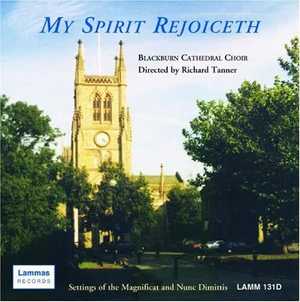My Spirit Rejoiceth

Blackburn Cathedral Choir, Blackburn Cathedral Girls’ Choir and The Renaissance Singers of Blackburn Cathedral
Nunc Dimittis in B flat Henry Smart
Magnificat Hereford Service Richard Lloyd
Nunc Dimittis Hereford Service Richard Lloyd
Magnificat in F Frederick John Read
Nunc Dimittis in F Frederick John Read
Magnificat in E flat Sydney Watson
Nunc Dimittis in E flat Sydney Watson
Magnificat in D Herbert Brewer
Nunc Dimittis in D Herbert Brewer
Nunc Dimittis in D minor Robert Ashfield
Magnificat Collegium Regale John Tavener
Nunc Dimittis Collegium Regale John Tavener
Magnificat Collegium Regale Herbert Howells
Nunc Dimittis Collegium Regale Herbert Howells
Total playing time 65m 13s
My Spirit Rejoiceth
Settings of the Magnificat and Nunc Dimittis
My Spirit Rejoiceth
The pieces on this CD are settings of canticles sung daily in English Cathedrals at the service of Evensong. This tradition dates back to 1549, when the first Booke of Common Prayer and Administration of the Sacramentes was published.
Evensong is an amalgam of the Latin services of Vespers and Compline. In theory, the Magnificat and Nunc Dimittis may be replaced by two other canticles, the Cantate Domino and Deus misereatur, though in practice the former are almost invariably used.This results in a service in which the canticles wonderfully complement the readings of scripture at the service.
The Magnificat comes from the first chapter of Luke's Gospel, sung by Mary on her visit to Elizabeth after she had heard that she was to be the mother of Jesus. It celebrates God's work in history, and comes in response to the lesson from the Old Testament, the scriptures of the ancient Israelites. In contrast, the Nunc Dimittis looks forward to Jesus as 'a light to lighten the Gentiles' and 'the glory of thy people Israel'. Sung in response to the New Testament lesson, the text comes from Luke Chapter 2, and was sung by Simeon at the occasion of the presentation of Jesus at the temple.
Blackburn Cathedral Music
There is a long tradition of music in worship at Blackburn. In 1514 Thomas Stanley, second Earl of Derby, founded a school, and its twelve boys formed part of the choir to sing Masses and Sunday services in the Parish Church. It is clear that the music was held in great esteem then, and a long succession of distinguished musicians have maintained and enhanced the high standard of choral singing. Famous organists of Blackburn include Henry Smart, Henry Coleman and Charles Hylton Stewart. Samuel Sebastian Wesley was almost appointed organist aged 17, however the Vicar of Blackburn rejected him on the grounds that he was too young and inexperienced to rid the gentlemen of the choir of their bad habits!
Since the Parish Church of St Mary the Virgin became Blackburn Cathedral in 1926, Lancashire's only Anglican Cathedral, the choir has grown in stature. The discipline and vast experience of Thomas Duerden (1939-64) laid the foundations of a Cathedral choral establishment. John Bertalot (1964-1983) brought to it his unique blend of excitement and inspiration. David Cooper (1983-1994) created a choral sound, which was characterised by its blend and attention to detail. From 1994 until Easter 1998 Gordon Stewart was Director of Music. Gordon was himself a pupil of John Bertalot and is well-known as both choir trainer and concert organist. At the start of June 1998, Richard Tanner became Cathedral Organist and Director of Music.
Blackburn Cathedral Choir
The Cathedral Choir is, and always has been, entirely voluntary. It sings a large repertoire to a very high standard. The choir sings at the Cathedral Eucharist and Choral Evensong on Sundays as well as on major feast days and for specified Diocesan Services. The trebles sing Evensong on Wednesdays.
In addition, under the direction of Richard Tanner, the Cathedral Choir has made broadcasts on both Radio and television. They have taken part in many special services and events. These include: the Festival of the Sons of the Clergy at St Paul's Cathedral (1999); a special service in the Cathedral, in the presence of HRH The Princess Royal, in June 1999 to celebrate the rebuilding of the Cathedral's Lantern Tower; and the Memorial Service for Jack Walker (Chairman of Blackburn Rovers Football Club). They have sung with the Royal Liverpool Philharmonic Orchestra, The Northern Chamber Orchestra and Manchester Camerata. LAMMAS records have released a number of recordings and the choir has undertaken highly successful tours to Germany and USA.
The Young People's Choir
The Young People's Choir was formed in the 1960s to provide an opportunity for boys to continue singing at the Cathedral after their voices had changed. In the 1970s a soprano line was added to the choir. There are about 20 singers, between the ages of 14 and 21 in the YPC. They sing Matins on Sundays each week and take part in a variety of special services and concerts, both at the Cathedral and around the Diocese, and are directed by the Assistant Director of Music. In 2002 the YPC undertook their first foreign tour, to Rome, as well as a live broadcast of Choral Matins on BBC Radio 4.
The Cathedral Girls' Choir
The Cathedral Girls' Choir was founded in 1997, and since September 1998 has greatly expanded in number and its musical output and repertoire has grown considerably. They have appeared on BBC TV's Songs of Praise. In April 2001 they went on their first foreign tour, to Germany and on May 7th 2001 they gave their first Radio broadcast on BBC Radio 4's Daily Service.
The Renaissance Singers
The Renaissance Singers, an adult chamber choir of about 40 voices, gives concerts and occasionally sings services in the Cathedral, around the Diocese and further afield. It was formed in the 1960's by John Bertalot and each successive Cathedral Organist has directed the choir.
Produced by Lyndon Hills
Recorded and edited by Lance Andrews
Cover photograph by Lance Andrews